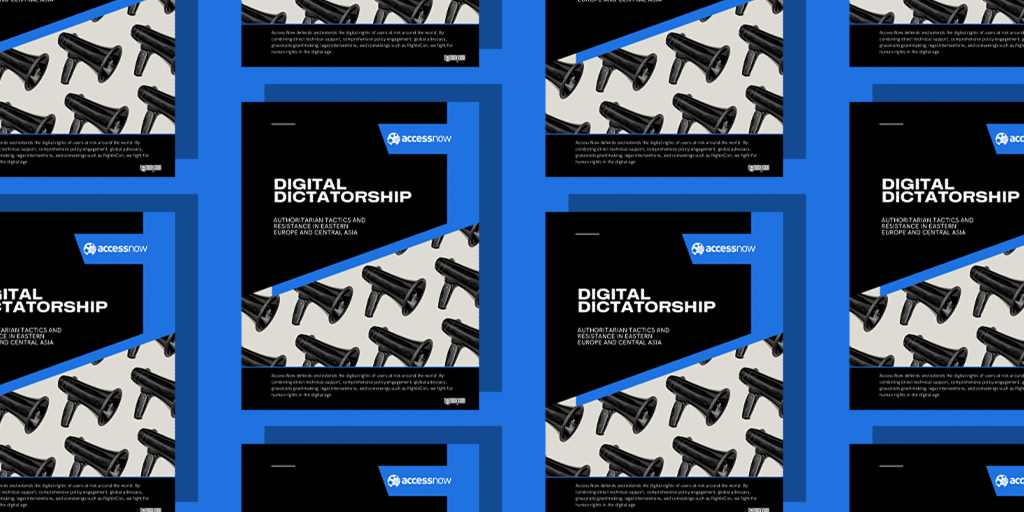Читайте на русском / Қазақ тілінде оқыңыз
The use of technology to repress democratic dissent is nothing new. Countries such as China and Russia are widely documented repeat offenders when it comes to deploying authoritarian tactics in digital spaces. Our latest report, Digital dictatorship: authoritarian tactics and resistance in Eastern Europe and Central Asia, explains how a digital dictatorship can emerge and how pro-democracy activists are fighting back.
What is digital authoritarianism?
Digital authoritarianism encompasses a wide range of policies and actions that governments deploy to exert pressure and exercise pervasive control over people’s lives. Here are the most common tactics we have documented in the EECA region:
Who are the rising digital dictators in the EECA region?
Levels of digital authoritarianism vary across EECA countries. Many were either part of or were occupied by the Soviet Union, and a number of countries in the region have either embraced authoritarianism or remain vulnerable to the tools and tactics of digital disruption.
Russia is particularly “advanced” in how it deploys digital authoritarianism, and our report takes a close look at the tactics and techniques of its aggression – exhibited most recently in the context of its invasion of Ukraine. This includes the Russia-backed spread of disinformation in Ukraine, Georgia, and Moldova, designed to disrupt their democracies and further destabilize the region. Neighboring Azerbaijan and Belarus are also entrenching the use of digital surveillance and online censorship legislation, regulations, and technologies to control the population. In Kazakhstan, Kyrgyzstan, Turkmenistan, Tajikistan, and Uzbekistan, authorities cut off internet access when citizens protest their policies, among other tactics for control. You can learn more about how digital dictatorships develop in our report — a stark warning to people in backsliding democracies around the world.
How civil society is fighting back: tools for resistance
The arsenal digital dictators deploy is diverse, but so is the resistance toolkit. Tactics range from grassroots digital activism and self-help measures to world governments holding digital dictators to account at the international level. Note that while international pressure and solidarity is key, we must ensure the measures for accountability, such as tech sanctions, do not harm civil society actors fighting for democracy.
As our report underscores, it is vital for democratic governments, tech companies, nonprofit organizations, and funders to support civil society organizations and frontline activists. This includes initiatives such as offering free Virtual Private Network (VPN) access, encryption and anonymity tools and services, or Distributed Denial of Service (DDoS) protection software. It must also entail support and advocacy for laws and policies to keep these tools widely available, and the global internet free, open, and secure. Learn more about the tools activists are using in our report.
It’s time to act
We call on governments to advance norms to regulate the digital space which fulfill human rights obligations, while dismantling frameworks which allow digital authoritarianism to flourish. We demand that tech companies cease selling surveillance tools or services to EECA regimes with a track record of violating human rights, and that they conduct human rights impact assessments before undertaking any business activities in the region — while ensuring that civil society actors fighting for democracy retain access to vital communications and digital safety tools.
We hope our report serves to call attention to what is happening in EECA countries, and helps democracies around the world identify and reject the tools and tactics of digital authoritarianism. Digital technology and the internet can be weaponized to repress people, but these tools remain vital for sharing information, self-organizing, and standing up together for human rights. In the EECA and around the world, stakeholders must continue to push for a future where resistance to oppression is not futile.
